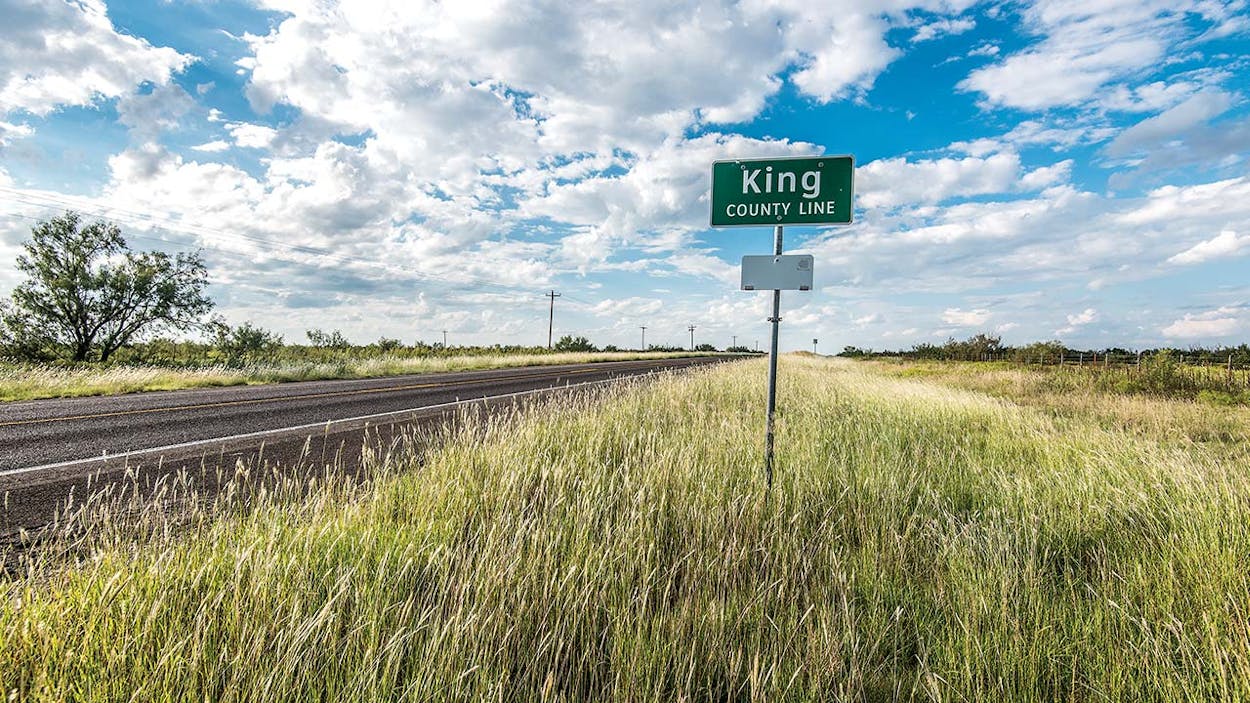King County, nestled in the southeast corner of the Panhandle, is the third-least-populous county in the United States. According to the 2015 Census, only 282 people call it home. Guthrie, the county seat, doesn’t even have a restaurant. Or a mayor.
It is, needless to say, the kind of place where everybody knows your name—within two hours of your arrival, apparently. On a recent morning, I stopped in at the courthouse, hoping to discuss the upcoming presidential election with county judge Duane Lee Daniel, only to find that he had stepped out. So I wandered around town in search of people to talk to, a straightforward mission given that there are just a handful of public places nearby. After dropping in at the post office, I went to the town’s only retail operation, the 6666 Ranch’s Supply House, and approached a woman—who stopped me before I had a chance to introduce myself. “Are you from Texas Monthly?” she asked. When, taken aback, I asked how she knew that, she explained that Judge Daniel had called to let her know that I was in town. Had he meant to warn her? No, she said; he was calling people so they wouldn’t bother calling to let him know.
After vouchsafing that her name wouldn’t appear in this magazine (“I’ll give you my opinion, but I don’t want my picture smeared all over the news”), the woman volunteered her thoughts on the race between Donald Trump and Hillary Clinton. “I’m for Trump,” she said. “Let’s just say that. Let’s just say, right now, I’m a conservative.”
I had come to King County because it is, in fact, the most conservative county in the country. In 2008, when Barack Obama was elected president, he won a mere 8 out of the 163 votes cast here. The following year, that strict conservatism prompted my former colleague Paul Burka to travel to King County in hopes of finding one of the few people who had voted for Obama. (He came up short in that effort.)
On this visit, I had a different task: to get a sense of whether Donald Trump had scrambled the local political calculus. Trump may be the Republican party’s current standard-bearer, but one would think that his antipathy to trade and his hostility toward Mexican immigrants wouldn’t play well in a state that is relatively comfortable with both. And his very Manhattan brand of vulgarity—getting his picture smeared all over the news is pretty much his raison d’être—would seem to be inimical to the Panhandle’s trademark reserve.
And yet Trump did very well in King County during the Republican primary; Ted Cruz, who dominated the election in most of Texas, barely edged him out here. What, I wanted to know, was going on in America’s reddest county?
The first thing I learned was that it’s tough to find anyone particularly enthusiastic about Trump’s candidacy. The nameless woman at the ranch store who forthrightly declared her support for Trump didn’t exactly speak glowingly of him. “I think he’s a rich man who could always buy what he wanted,” she said. She offered a few points in his favor: his background is in business rather than politics; his children seem to be well raised; and she had heard that he didn’t drink. But Trump’s primary advantage, in her telling, was that he’s not Clinton. “I think she’s a puppet on a string,” she said.
Ray Ferguson, an irrigator who was working in Guthrie, offered a similarly measured case for Trump. (Ferguson actually lives two hours away, in conservative Hockley County, but he was happy to share his views.) “He talks trash too much,” he said while eating lunch. “I don’t get why he wants to divide us.” Ultimately, though, Ferguson was going to pull the lever for the real estate tycoon, even if he wasn’t thrilled by the prospect. “I don’t have a Trump sign in my yard,” he said. “Not many people do.” And he was correct; making the rounds in King County, I hadn’t seen a single Trump sign.
Leslie Baxter, the deputy county clerk, was among several residents who expressed disapproval of Trump’s anti-Mexican slurs. “I worked at the prison in Spur, so I saw a lot of the illegals brought in,” she said. “There were good ones and there were the drug cartel members. And I’ve seen the other side, the agricultural side, where these guys work hard—they’re good people.” Still, she was no fan of Clinton’s; the Democratic nominee’s recent “basket of deplorables” remark had struck her as uncharitable.
These sorts of sentiments were what I heard throughout town: hesitation about Trump outweighed by distrust of Clinton and the Democrats in general. It was hard to find anyone who felt a strong sense of identification with the Manhattan millionaire. Still, he will surely triumph here this month, if only for one reason: our country has two major political parties, and one of them made him its nominee.
- More About:
- Politics & Policy
- Donald Trump








